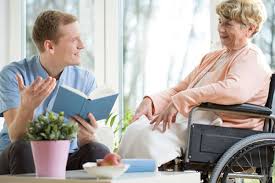
When researchers at the Future of Nursing Campaign for Action discovered large gaps between what academia thought training nurses needed and what would actually be expected of those nurses in their first nursing positions, one issue had to do with language. At Action Products, we take great pride in our ongoing role in working with nurses, we were fascinated by the National Institute of Aging’s tutorial on effective communication with elder patients.
From a general point of view, the authors explain, what was once called "bedside manner" is becoming the subject of many empirical studies, the results of which point to the fact that effective communication with patients:
- helps prevent medical errors
- leads to improved health outcomes
- uses limited interaction time more efficiently
Communicating with geriatric patients, the authors continue, requires an entire set of specific practices:
- Use proper forms of address – use Mr., Mrs., Ms., and so on, avoiding patronizing terms such as "dear" and "hon".
- Allow time to establish rapport – introduce yourself clearly, not speaking too quickly (Older people may have trouble following rapid-fire questioning or torrents of information, and need time to process what is being asked or said.)
- Avoid interrupting, using active listening skills (face the patient, maintain eye contact, and use frequent, brief responses, such as "okay," "I see," and "uh-huh."
- Avoid jargon, and do not assume patients know medical terminology related to their condition.
It is vital that nurses compensate for hearing deficits in elderly patients, making sure the patient can hear you. Ask patients if their have a working hearing aid. Talk slowly and clearly in a normal tone (shouting or raising your voice distorts language sounds and implies anger; a high-pitched voice is hard to hear. Face patients at eye level, allowing them to lip-read or pick up visual clues, keeping your hands away from your face.
Since Action Products, Inc. engages in the design, manufacture, and distribution of pressure relieving support surfaces for use in the medical field, we are all about preventing the harmful effects of pressure. Avoiding pressure injury in geriatric patients might involve products such as pads, positioners, and overlays for healthcare in hospitals, care facilities, and at home.

